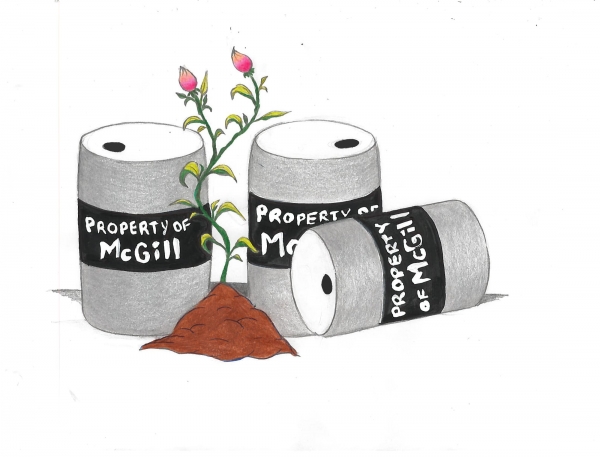“International research results have undoubtedly established that climate change and its resulting socio-economic impacts pose a serious threat to life on earth.”
This is the first sentence from the letter that Suzanne Fortier opens McGill’s Vision 2020 Climate and Sustainability Action Plan with. The letter goes on to say that McGill should act in accordance with the science it produces. If the university wants to live up to this statement, the McGill Board of Governors (BoG) must divest from fossil fuel companies this year.
The Committee to Advise on Matters of Social Responsibility (CAMSR) is responsible for investigating and recommending divestment, among other socially responsible investing practices. After CAMSR makes their recommendation, the final decision ultimately rests with the BoG. However, all of CAMSR’s eight members sit on the Board. By allowing members of BoG to sit on CAMSR, the committee will inherently be subject to Board politics.
The strongest example of the Board’s influence on CAMSR was the proposed revision of its terms of reference in 2018. The Nominating, Governance, and Ethics Committee (another committee comprised of members of the BoG), proposed changing CAMSR’s mandate to prevent them from recommending investments that advance specific social or political causes. This would have prevented CAMSR from recommending divestment from any companies that engage in harmful practices, including fossil fuel companies.
McGill has divested twice in the past: From companies doing business with South Africa’s apartheid regime in 1985 and from tobacco companies in 2007. Divestment has shown to be an exceptionally effective tool for shaping public discourse and bringing attention to these harmful practices. As a prestigious public institution, McGill withdrawing their support for fossil fuel companies would send a powerful message about the climate crisis facing humanity.
CAMSR is currently investigating divestment for the third time after deciding not to recommend divestment in 2013 and again in 2016. They will make their decision in December, meaning the next few months will be critical for students, faculty, and administration to put pressure on the Committee.
“McGill has divested twice in the past: From companies doing business with South Africa’s apartheid regime in 1985 and from tobacco companies in 2007.”
The 2016 investigation was neither thorough nor transparent. CAMSR consulted six experts throughout their investigation, none of which were experts in ethical investment. Their testimonies were withheld from the public until Divest McGill conducted a sit-in at the James Administration building, after which five of the six testimonies were released. In their upcoming investigation, CAMSR should consult experts in ethical investing and make their testimonies publicly available.
Further, CAMSR’s current chair, Cynthia Price Verreault, worked as the director of retail services for PetroCan for 18 years. Given PetroCan’s status as a fossil fuel company, this affiliation is a glaring conflict of interest within the context of divestment.
One year ago, McGill’s Senate adopted a resolution in favour of divesting from fossil fuels. The BoG responded by referring the matter back to CAMSR. This decision led two members of the Board to resign in April, stating that they could not maintain solidarity with a Board that “places the university in ethical jeopardy and undermines the integrity of collegial governance.”
As long as CAMSR is led by an ex-PetroCan executive and comprised of Board representatives, there is no reason to believe that the outcome of this investigation will be any different than the last. If CAMSR does not recommend divestment this time, serious reform will be required to insulate CAMSR from BoG politics.







